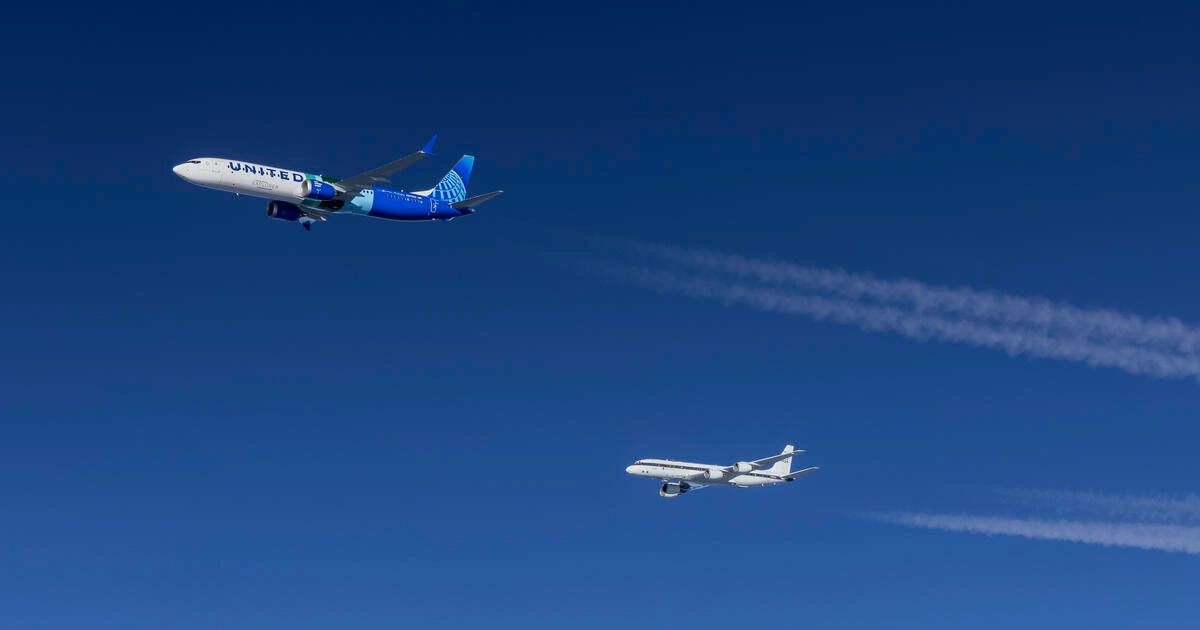Researchers are showing optimism in the initial results from a study involving a Boeing 737 Max 10 airliner, part of Boeing’s EcoDemonstrator program. This study, conducted in collaboration with NASA’s DC-8 Airborne Science Laboratory, focuses on understanding the impact of sustainable aviation fuel (SAF) on contrail generation.

(Photo: Boeing) Boeing’s 737 Max 10 EcoDemonstrator and NASA’s DC-8 Lab Investigate SAF’s Influence on Contrail Formation
While it’s widely acknowledged that SAF can potentially reduce CO2 emissions from aircraft by up to 80 percent over their lifecycle, there’s less clarity on how SAF influences the characteristics of contrails compared to traditional kerosene-based fuels. This gap in knowledge has led Boeing to join forces with United Airlines and NASA in this investigative venture using their latest EcoDemonstrator aircraft.
Contrails, the visible trails left by planes in cold, humid atmospheres, are known to contribute to atmospheric heat retention. To delve deeper into this phenomenon, Boeing commenced flights in early October with a CFM Leap-1B-powered 737 Max 10, which is set to join United Airlines’ fleet. This aircraft is unique in that it carries both 100 percent SAF and conventional fuel in separate tanks, allowing for a comparative study during flight tests. This approach enables researchers to distinguish the emission reductions attributable to advanced fuel formulations from those due to engine technology improvements.
Although the data collected from the initial weeks of testing is still limited, the collaborative team, including experts from Boeing, NASA, GE Aerospace, and Germany’s DLR aerospace research center, has expressed a positive outlook. Christiane Voigt, the lead researcher from DLR, shared insights from Seattle on SAF’s potential to alter contrail formation. She highlighted that SAF’s lower aromatic content, which leads to reduced soot particle emissions, could significantly impact the formation of ice crystals and contrails. Voigt emphasized the importance of this research, noting that contrail-induced warming could rival the effects of CO2 emissions.
NASA’s DC-8 Airborne Science Lab plays a critical role in this study, flying behind the EcoDemonstrator to analyze the emissions and ice particles in contrails produced by each fuel type. Operating from NASA’s Armstrong Flight Research Center, the DC-8 is equipped with specialized sensors and data systems. Nicki Reid, an operations engineer and mission manager for the NASA Airborne Science Program, explained the methodology of alternating fuel types during the flights to compare their respective impacts.
This series of EcoDemonstrator flights builds on previous tests conducted in 2021 and 2022 with a 737 Max 9 and a 777-200ER. These earlier tests confirmed significant reductions in particle emissions when using paraffinic SAF, with the degree of reduction varying based on the SAF’s chemical composition. Steve Baughcum, a Boeing emissions technical fellow, elaborated on the findings, noting the lower sulfur content in synthetic SAF and its implications for soot and volatile aerosol emissions, which in turn affect contrail properties.
The SAF used in these studies, funded by the FAA’s Ascent Center of Excellence, is sourced from World Energy in California. Boeing has set a goal to make its aircraft fully compatible with 100 percent SAF by 2030. Mike Sinnett, Boeing’s vice president of product development, emphasized the need to examine the long-term effects of SAF on aircraft components, particularly those in contact with fuel. He pointed out potential issues such as seal damage in aircraft previously exposed to conventional jet fuel, given SAF’s lack of aromatics that aid in seal expansion. Additionally, Sinnett mentioned the need to adapt fuel gauging systems to accommodate the density variations in SAF compared to traditional jet fuel.


